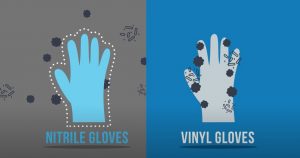Vinyl is a manufactured resin or plastic consisting of polyvinyl chloride(PVC), generally manipulate for covering materials. But there is another use for this. Gloves are also made up of vinyl. Vinyl gloves are made of PVC too.
Nitrile is a synthetic copolymer that is formed through acrylonitrile and butadiene combining. There is also nitrile made from gloves. Here we will discuss these two types of gloves and their use of authenticity for food.
Gloves are a key factor in any food service operation or food preparation. According to FDA (food and drug administration), any employees from food factories or restaurants may not contact, exposed, to ready-to-eat food with bare hands. Also, separately used gloves should be used for one task or should be discarded when damaged or when changing tasks.
So, it is important to use skin-friendly, comfortable gloves which can ensure food safety keep.
Materials that made Vinyl and Nitrile

Vinyl: Vinyl is commonly used as a shorthand name for PVC ( polyvinyl chloride). Vinyl is composed of two simple building blocks:
- Chloride based on common salt and
- Ethylene from crude oil or it’s can also found in natural gas
So, if we simply put up, vinyl is made up of two substances – salt and oil. And the process to make vinyl is called cracking
Vinyl is the world’s most adaptable plastic, used in a range of products from flooring to siding to wall covering then from food wraps to auto body parts. Today vinyl is the second largest buying plastic in the world and industry employees from all over the using this with satisfaction.
Nitrile: Nitrile is also known as Buna-N or NBR (nitrile butadiene rubber). It is a type of synthetic rubber polymer. Nitrile is a synthetic copolymer formed through acrylonitrile and butadiene combining.
Nitrile is produced by emulsifying butadiene and acrylonitrile together in water and then polymerizing the outcome.
Nitrile is most popular for its oil resistance, although it’s also temperature resistant. Nowadays nitrile is the most widely and elastomer in the seating industry.
Advantages and disadvantages of vinyl/nitrile
Vinyl

It seems like vinyl is in almost everything. It is in our flooring, our daily wear, our phone, and whatnot. Vinyl has a lot of o advantages over other plastics in the world. The most satisfying and obvious is that vinyl is cheaper than other plastics. From flooring to a pair of gloves it’s always at a reasonable price. Which can be good for us when we are on a budget.
But with this enormous use of vinyl the most important question can be is it environmentally friendly? Well, the vinyl manufacturers and trade organizations say, Yes! Because PVC or vinyl is mostly made from natural materials and it supposedly uses less energy to manufacture than other plastic. Also, vinyl products can be recycled into new applications which can also be lasting decades or more.
However, there are also some disadvantages of vinyl. Environmentalists say that PVC production discharges dioxins and pollutants and we could be exposed to them by inhaling polluted air near manufacturing factories. We can also unknowingly intake unhealthy chemicals by eating food in PVC line packaging and drinking water transported in PVC pipes.
Nitrile

Nitrile rubber is more resistant than natural rubber to chemicals, oils, and acids, and has superior strength. Nitrile disposal gloves are three times more puncture resistant than latex and are more chemical-resistant than latex or vinyl. It is also best for high-risk situations around infection materials. It has also good rebound quality and non-polar solvent resistance.
Some disadvantages of nitrile rubber include :
- Poor resistance to ozone, weather, and sunlight.
- Minimal resistance to high temperatures.
- Poor flame resistance.
Also, nitrile costs are more often than vinyl. It would be a more expensive option.
And the most dangerous thing about it is that exposure to nitriles in humans and experimental animals can result in neurologic, hepatic, cardiovascular, renal, and gastrointestinal disorders.
Uses of vinyl and nitrile
As I said before nowadays vinyl is in everything. The versatility of vinyl makes us think like where we can not find this. Vinyl has existed for almost a century and day by day it becomes more and more versatile.
This economical PVC or vinyl is used in a
- Building and Construction
- Siding and windows
- Wiring and cables
- Water pipes
- Packaging
- Healthcare
- Household products.
Nitrile is a synthetic rubber that originated from acrylonitrile and butadiene.
Nitrile used in
- With the help of nitrile, the automotive and aeronautical industry produces fuel and oil handling hoses, seals, and self-sealing fuel tanks.
- Nitrile is similarly used in the nuclear industry to make hand-protective gloves for employees.
It is also valuable equipment for disposable lab, cleaning, and inspection gloves.
Which one is better for you and why
With a mixture of synthetic rubber, plastics, and additives which are also called PVC, Vinyl gloves are created. Blue Vinyl Gloves are made with a flexible material that allows greater extradite and fingertip sensitivity. It is designed powder free which is appreciated by shape and put prep workers. because there wouldn’t be any way to leave Behind latex after removing the gloves. They were also developed as a great option for those suffering from latex allergies.
Nitrile gloves are made from a synthetic rubber called acrylonitrile butadiene rubber. These are constructed from premium materials designed to be more durable and hold up to break down from animals’ oil and foods. it is also comfortable for fitting and fingers to take sensitivity. But nitrile gloves were the first developed to solve the common problems of allergic reactions.
Both the Vinyl and Nitrile gloves are skin-friendly, comfortable to wear, and easy to put on. Both have some advantages and disadvantages which make them better suited for particular tasks.
But nitrile is more resistant to chemical temperature extremes and oils and fats. Whether Vinyl Gloves are resistant to water oil and fats but not as durable as nitrile. so we can say nitrile gloves are for food handling and health care than vinyl.
Other than vinyl and nitrile gloves there have some alternative gloves to use in foods: Polyethylene, latex, and neoprene gloves.

I am not a good blogger but I started blogging when I was in my college. one day scrolling my social media pages and top of the page one notification was coming like this “ earn money from blogging”.then I clicked that notification. After that, I was confused that which niche is better for me. Finally, I selected the niche and I was comfortable with that glove’s reviewer.

